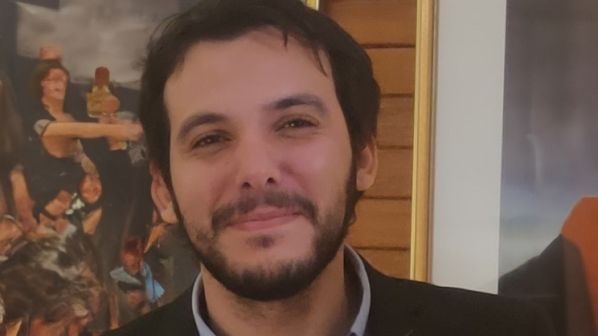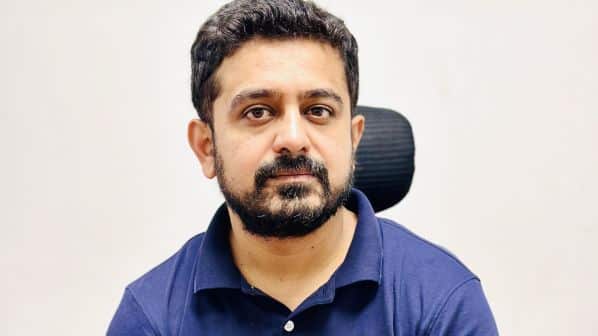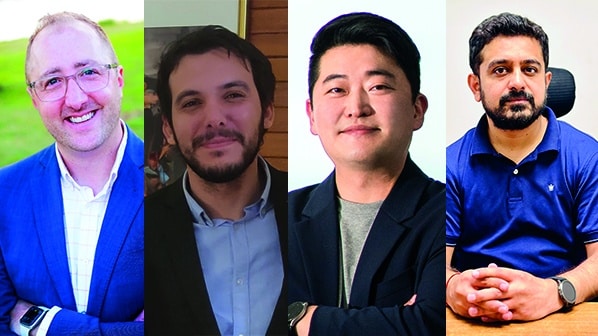Nick Langel
Director of Intermodal Sales, Union Pacific, United States
Age: 38. Years in the industry: 16
NICK Langel credits the darkest moments of his life - the tragic murder of his mother-in-law by his father-in-law and the later breakdown of his family around eight years ago - for spurring him on to become the successful person he is today.
“Instead of internalising the issue and going down a similar dark path, I channelled that energy and poured it out positively by starting to get involved in the community,” Nick says. “I began volunteering on a small basis, taking my son with me, while meeting new people. I eventually started taking on more responsibility, was accepted onto multiple boards in the Omaha non-profit community, and also started to thrive in my career at Union Pacific (UP).”

Among his achievements at UP are the establishment of the first on-dock intermodal service in Portland, Oregon, convincing traditional ocean shippers ONE and SM Line to also use rail, and facilitating the purchase of 980 refrigerated wagons for UP. He also led an initiative to upgrade 14 grain elevators in Iowa and Minnesota to support 110-wagon trains.
Nick says his biggest achievement was leading negotiations and successfully bringing a new customer to UP, which offers potential business of up to $US 1.2bn.
“The account we were bidding for was too large for one person to target alone, so I strategically formulated a team to proactively court the customer,” he says. “I leveraged the skills of the individuals that I pulled into the team, so that we had the most well-rounded package. I had functional owners give presentations, overviews, and tours of UP processes and facilities to ensure the customer had full comfort and trust in our company. After we won the business, I hosted weekly onboarding calls and brought in every group from UP to ensure a smooth transition for the customer. In the end, we had 103 people that were able to make a positive impact on the team and help negotiate and onboard the customer.”
Among his philanthropic work is leading the community investment review team for the United Way of the Midlands, and serves as a board member for the Christ Child Society of Omaha. He has also led various charity fundraising efforts in the local community.
Nick says his career objectives centre around making the rail industry a more healthy and sustainable part of the economy, citing his goal to build a new intermodal area in an up-and-coming city such as Austin, Texas, or Boise, Idaho. He also wants to establish UP as a leader in the Omaha philanthropic community.
“I have been deliberate about pushing my fellow co-workers to get involved and make an impact in our community,” he says. “I hope that when I’m in an executive role someday, that I can create even more change and positive impact on UP’s stake in the communities we serve.”
Med Mehdi Dib
Chief Technology Officer, EPE Rail Electr, Algeria
Age: 32. Years in the industry: 9
MEHDI Dib’s journey into the railway industry is perhaps slightly unconventional. His academic background is in robotics and industrial computing, and while a native of Algeria, he won a scholarship through the Swedish Institute’s Young Leaders Visitors Programme. While in Sweden, he was drawn by a friend back in Algiers into a project to update a split-flap passenger information display at the city’s main railway station.
While the display manufacturer offered to replace the entire system, his friend asked him to come up with a more cost-effective solution that would retain the existing display. Mehdi says he reverse-engineered all the mother board and server cards, to come up with a solution.

When attending the station’s grand reopening, an event attended by the minister of transport and the CEO of Algerian National Railways (SNTF), Mehdi recalls how the old-fashioned appearance of the split-flap display was criticised. He quickly passed the SNTF CEO his mobile phone and told him to write whatever he liked into it. What was written suddenly appeared on the display, leaving the CEO extremely impressed.
He was subsequently approached by the CEO of EPE Rail Electr about joining the company as an IT assistant. He has since risen to become the firm’s chief technology officer (CTO).
EPE Rail Electr provides maintenance services for railway electrification equipment in Algeria. Much of Mehdi’s work has focused on using IoT and other technologies to support SNTF with maintenance of its ageing infrastructure. Mehdi says that this has become especially pertinent as budgets for maintenance have been slashed and the railway has had to use its resources more wisely. He has also helped develop software for stock management, and geolocation solutions for rolling stock.
A key recent project for SNTF is the development of preventative maintenance techniques for pantographs. Mehdi says around 40 pantographs were being damaged each month on the Algiers RER due to maintenance issues. He subsequently developed an IoT-based system equipped with cameras and sensors and worked with Stadler to install this on a Flirt EMU operating on the RER. The system can precisely locate infrastructure faults, issuing notifications to maintenance teams that are able to visit the location and correct the issue at the next available opportunity.
The technology succeeded in reducing the number of incidents to almost zero, Mehdi says. Further updates include the addition of Lidar sensors to identify in 3D objects that are or could potentially interfere with catenary such as trees.
Contrasts
Mehdi says that EPE Rail Electr’s approach contrasts with traditional railway suppliers. He says that while major firms are keen to offer more sophisticated technologies to SNTF to replace outdated equipment, including signalling that relies on more than 40-year-old relays, EPE Rail Electr is focusing on developing new maintenance techniques using IoT to prolong asset life.
Mehdi believes this is more suited to rail and the capabilities of SNTF, which does not necessarily have the expertise in-house to adopt the latest technology. “We can be competitive, especially in our region,” he says. “We are developing the products, and we are using cheap and accessible technology to do so.”
Looking ahead, Mehdi believes that greater availability of data now readily collected from railway assets could prompt further improvements in infrastructure performance. His new pet project is his most ambitious yet: the development of an open-source platform for asset information. He hopes that this can channel experience, especially from IT, to have a tangible impact on railways in North Africa and beyond.
His belief is that wider access to this information will prompt the development of small and medium-sized upgrade projects. He reports receiving an encouraging response from railways in Morocco, Tunisia and Jordan to his proposal. Yet there are challenges still to overcome, namely accessing data held by major private-sector players who he says are reluctant to share their information. “Some private players in some countries do not share even the basic stuff,” he says.
Yet if there is one thing that his career has shown, this difficulty is only likely to spur Mehdi on. It is certainly an idea and an initiative to keep an eye on.
“It’s a project that is eating me alive,” he says. “I really want to do this and make something that is accessible to more people so we can help solve these problems in more places.”
Se Yeon Won
Manager, Korail, Korea
Age: 35. Years in the industry: 7
IN a country with a traditional hierarchical working culture like Korea, convincing senior leaders to embrace a new idea might appear a daunting if not futile task, especially if that idea comes from a younger, less experienced member of the team.
Yet Korail’s Se Yeon Won was not to be deterred. He spotted an opportunity in February 2020 to reduce the cost of procuring spare parts and maintaining the components and systems of Korail rolling stock by turning to domestic rather than international suppliers. He subsequently made it his mission to convince decision-makers to back his proposal.

With colleagues initially not convinced by his idea, Se Yeon gathered product specification data and estimate sheets and compared them to find the evidence that his approach was correct. This was a time-consuming task. But with the answer now staring them in the face, Se Yeon convinced his seniors to back his proposal.
A task force was subsequently established to implement Se Yeon’s idea and oversee the new administrative process that has been introduced for purchasing components. Effective communication was again critical to Se Yeon’s success as he brought together a diverse group of management, procurement and technical staff to form the new group. And it has been a great success. Purchasing costs have been reduced by Won 1.6bn ($US 1.2m) while Se Yeon has also identified several domestic companies capable of repairing every component.
By repairing rather than replacing items such as transformers, traction motors and brake cylinders, Korail is not only saving money. It is also assisting the expansion of Korean small and medium-sized companies into new areas. Se Yeon has provided these suppliers with access to testing facilities and technology at Korail. They are also receiving advice on securing grants to enable them to develop the necessary technology and expertise.
Se Yeon is described by his nominator as a colleague “that everyone wants to work with because he is very kind and calm even in difficult situations.” He also works hard, even staying late at the office when working with colleagues overseas to achieve the optimal result. It appears he has a bright future. “I have high expectations for him to become a competent executive within Korail,” his nominator states.
Nitansh Platia
Kalpataru Projects International, India
Age: 37. Years in the industry: 13
HAILING from the small town of Solan in the foothills of the Himalayas, Nitansh Platia really found his feet after making the bold decision to attend a college in Bhopal, more than 1000km away. A willingness to throw himself into public speaking and cultural clubs while at university helped Nitansh overcome his natural shyness. A presentation during his final year at the Indian Institute of Technology (IIT) at Delhi in 2007 was a critical moment and proved the foundation for his desire to pursue work placements and enter the rail industry.
Nitansh has worked at Alstom, Jindal Steel & Power (JSP), and Kalpataru Projects International (KPIL) over the past 13 years. At JSP, he worked to optimise the rail production line to increase output for Indian mainline and metro projects. At KPIL he has played a prominent role in leading the company’s railway electrification activities, which have contributed significantly to the Indian government’s objective of achieving complete electrification of the national railway network.

KPIL has delivered 20% of lines electrified in India over the last three years, including during the Covid-19 pandemic when Nitansh was overseeing more than 20 KPIL railway projects. He worked to ensure sufficient availability of both manpower and materials so this work could continue during Covid restrictions. He initiated online meetings to keep teams connected and accessed special funding to pay for sanitising workplaces and to provide protective clothing and equipment where required. Rather than hindering project delivery, the pandemic proved an opportunity to accelerate work, as fewer train movements provided more time on the track to complete electrification. Nitansh contacted previous labour suppliers to secure sufficient personnel to complete this work while meeting necessary safety protocols.
Nitansh is described by his nominator as being very humble and extremely polite with his subordinates as well as senior management. He has served as a mentor to summer interns at Alstom, JSP and KPIL.
Nitansh has also actively participated in KPIL initiatives focused on the preservation of water and natural resources, leading the planting of 50,000 saplings as part of a project in the state of Jharkhand. As part of the company’s community service engagement, he has collected food, clothing and essential supplies for the Sida Sudarshan Sakshi Dham orphanage in Ghaziabad. He also provides support to several self-help groups and has helped to improve child education in the state of Jharkhand.
Nitansh’s short-term objectives include working to expand KPIL’s activities beyond India. He has already identified areas where it could deliver railway projects and a dedicated team, established by Nitansh, is now meeting the necessary technical requirements and bidding for contracts. He hopes that this work will further establish the company as a major presence in the global railway industry and reinforce his position as a prominent Young Rail Leader.
Part 1 of Young Leaders in Rail Awards 2023 can be found here
Part 2 of Young Leaders in Rail Awards 2023 can be found here
Part 3 of Young Leaders in Rail Awards 2023 can be found here

